
“I am the Living One; I was dead,
and now look, I am alive for ever and ever!”
Revelation 1:18
I’m not a big fan of Good Friday services. Jesus did institute the Lord’s Supper as a remembrance of his death, of course, but he did not designate a special day for it. My problem with Good Friday is that churches tend to “celebrate” it with a funeral. Sanctuaries are often draped in dark colors and congregations are led through somber hymns, stations of the Cross, meditations on their sinfulness, and sermons about agony and abandonment. It’s an annual ritual of mourning, not unlike the “weeping for Tammuz” ritual mentioned by the prophet Ezekiel. And although the apostle Paul tells us that Jesus died to sin once for all, Good Friday services seem to insist on crucifying the Son of God all over again every year. To put it rather harshly, and at the risk of offending my devout brothers and sisters, Good Friday observances often seem to me a kind of soft-core Passion-porn.
Is this the kind of fast I have chosen,
only a day for people to humble themselves?
Is it only for bowing one’s head like a reed
and for lying in sackcloth and ashes?
Is that what you call a fast,
a day acceptable to the Lord?
My Scrooge-like aversion to self-flagellation notwithstanding, the death of Jesus cannot be minimized. It is at the Cross where God held humanity fully accountable for its sin and satisfied the demands of incalculable justice. Christ’s sacrifice cannot be reckoned by somber contemplation, exquisite explications, or stylized reenactments. 700 years before the Cross, Isaiah descried an unfathomable mystery: He was pierced for our transgressions, he was crushed for our iniquities; the punishment that brought us peace was on him, and by his wounds we are healed. The bumper sticker is indeed true: Jesus died for our sins.
But that is not good news. It is, in fact, the worst news possible. The death of Jesus did not save humanity; it killed us. God sent his own Son in the likeness of sinful flesh to be a sin offering, writes Paul. And so he condemned sin in the flesh. The cross is not a pardon but a condemnation. The dark before creation is nothing compared to the horrifying darkness that swallowed the world when the Son of God gave up his spirit. Although death had reigned over humanity since our first parents’ disobedience, in his forbearance God had left the sins committed beforehand unpunished. The Cross was the end of that divine forbearance—and the end of humanity. Christ’s death did not deliver us from death; it delivered us over to it. Jesus did not die so that we don’t have to. As Paul contends, his death is our execution: one died for all, and therefore all died. No one survived the Cross; at the Cross all died, and for three days there was no life in the world. Good Friday is not good—at all.

And so we come to Easter. For many, the resurrection of Jesus is a bonus. The Cross, we assume, is where the real work was done, and so the resurrection is an added benefit. Not so. Paul makes it clear: If Christ has not been raised, our preaching is useless and so is your faith. Without the resurrection, the death of Jesus brings only certain doom. But as Paul also declares, “God raised him from the dead.” The blood of Jesus is made effectual by his resurrection. Easter gives meaning to Good Friday, not the other way around.
The resurrection is the defining feature of the gospel. It is by his resurrection from the dead that Jesus is appointed the Son of God in power and enthroned as Christ our Lord. As such, the resurrection, not the Cross, is the guarantee of salvation. If you declare with your mouth, “Jesus is Lord,” and believe in your heart that God raised him from the dead, you will be saved. The resurrection is the whole point of the Cross. As Paul tells the Corinthians, We always carry around in our body the death of Jesus, so that the life of Jesus may also be revealed in our body. Christianity is about life, not death.
And it is the resurrection of Jesus that defines what it means to be a Christian. His life becomes our life, and though we embrace the Cross, it is as the crossover from sin to salvation, from everlasting death to eternal life. Count yourselves dead to sin but alive to God in Christ Jesus, exhorts the apostle, who also tells us, He died for all, that those who live should no longer live for themselves but for him who died for them and was raised again. The Cross destroyed us; the resurrection defines us.
Christ’s sacrifice and resurrection are not two separate events but one redemptive reality: the CRUCIREXION, if you will. To be sure, Christ was sacrificed once to take away the sins of many. But he is risen from the dead, and he will appear a second time, not to bear sin, but to bring salvation to those who are waiting for him. On that day, whatever remains of the Cross will be swallowed up in victory and life. Death shall die.
He is risen, my friends. He is risen indeed.

But for you who fear my name,
the sun of righteousness shall rise
with healing in its wings.
Malachi 4:2
